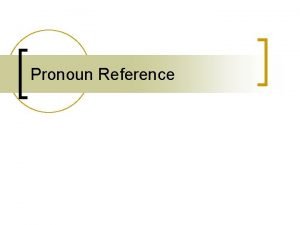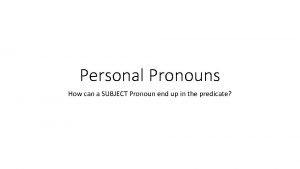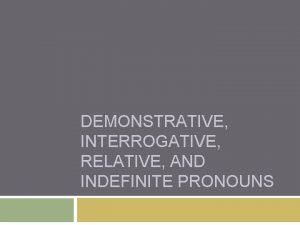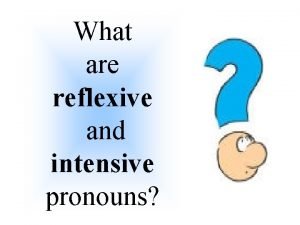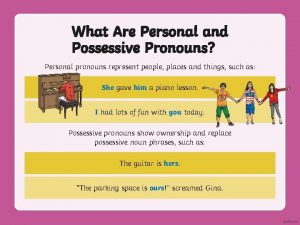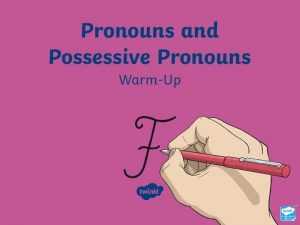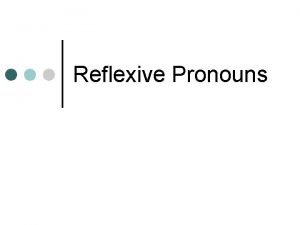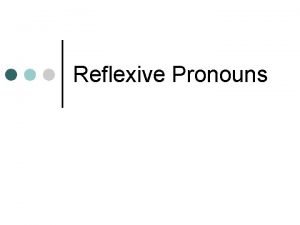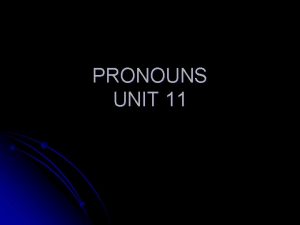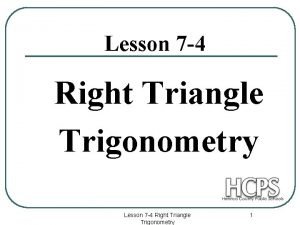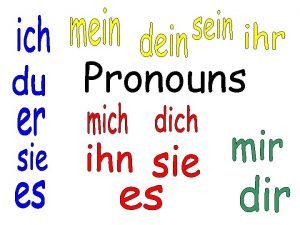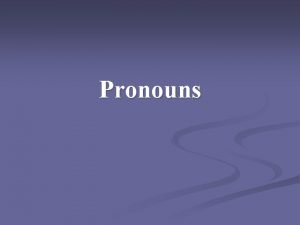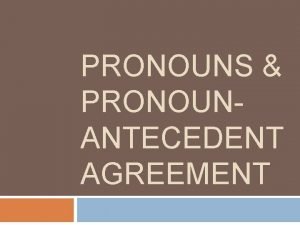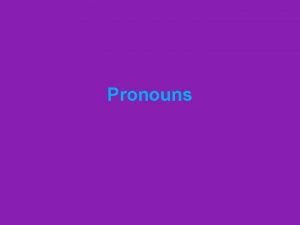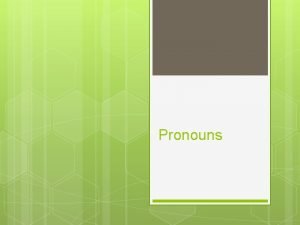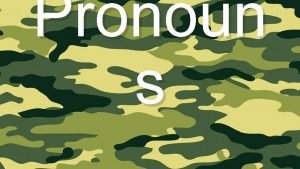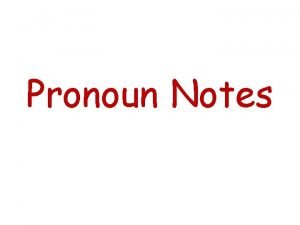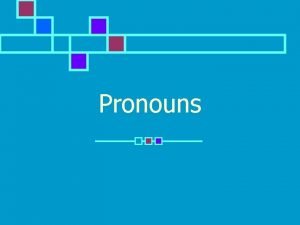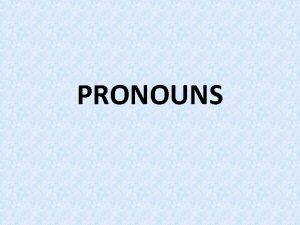Unit 2 PRONOUNS What are Pronouns a pronoun



















- Slides: 19

Unit 2 PRONOUNS

What are Pronouns? • a pronoun is defined as a word or phrase that may be substituted for a noun or noun phrase. • The replaced noun or noun phrase is known as the pronoun’s antecedent. • How is this possible? In a nutshell, it’s because pronouns can do everything that nouns can do.

Categories of Pronouns There are eight categories of pronouns. The categories of pronouns are: Personal Pronouns Possessive Pronouns Demonstrative Pronouns Reflexive and Emphatic Pronouns Interrogative Pronouns Relative Pronouns Reciprocal Pronouns Indefinite Pronouns

Personal Pronouns Personal pronouns associated with a certain person, thing, or group; all except you have distinct forms that indicate singular or plural number Pronouns have three cases: Nominative (Subjective) Objective Possessive The case depends on the pronoun’s function in the sentence. • A first-person pronoun is the one speaking. • A second-person pronoun is the one spoken to. • A third-person pronoun is the one spoken about.

Nominative Case Personal Pronouns Use nominative case when the personal pronoun is the subject of a verb. When a personal pronoun takes the place of a noun as the subject of a sentence, it is both a personal pronoun and a subject pronoun. What is a subject pronoun? In essence, it’s any pronoun that is used to replace a common or proper noun as a sentence’s subject. Examples: • • • He sends e-mail messages to a customer in Spain. I use the telephone frequently, but she prefers to use e-mail. You can send an e-mail message to many people at once. It is inexpensive to use e-mail for communication You need to stop lying.

Nominative Case Personal Pronouns The person – Who is speaking? The number – Is the pronoun plural or singular? The gender – Is the pronoun feminine (she), masculine, or neuter? Singular Plural 1 st Person I We 2 nd Person You 3 rd Person She, He, It They

Objective Case Personal Pronouns Use the objective case of personal pronouns when the pronouns are direct or indirect objects of verbs or when it is the object of a preposition What is an object pronoun? It’s any pronoun that is affected by the action the subject of the sentence takes. Singular Plural 1 st Person Me Us 2 nd Person You 3 rd Person Her, Him, It Them

Objective Case Personal Pronouns Direct object of a noun: • Mary asked her for a copy of the report. • My friend gave him my e-mail address. • The e-mail security presentation impressed Mina and me. Direct object of a Preposition: • I received two e-mail messages from her today. • John spoke with us about Internet scams. • Mary sent the e-mail attachment instructions to Leo and him.

Personal Pronouns I have to submit an assignment. John helped me. Do you like John? John likes you too. He runs fast. Did Ram beat him? We went home. Anthony drove us. I want you to read this book. You are the fastest runner on the team, and we’re depending on you. They talked to me about acting in the play. We enjoyed hearing her sing.

Compound Personal Pronouns Compound personal pronouns consist of a personal pronoun and the suffix self or selves. A compound personal pronoun is used to add emphasis or to refer to a previously named noun or pronoun. Singular Plural 1 st Person Myself Ourselves 2 nd Person Yourself Yourselves 3 rd Person Herself, Himself, Itself Themselves

Compound Personal Pronouns Use the intensive compound personal pronoun to add emphasis to a noun or to another pronoun. • John himself assured us the mail will be delivered. • I myself use Snapchat every day. Use the reflexive compound pronoun to refer to a noun or pronoun that is used as the subject of a sentence. • Mary gave herself a much needed vacation. • The employees taught themselves the new e-mail system. The words hisself, ourselfs, theirself, theirselves, yourselfs, or themselfs are not standard English words !!!!

Possessive Pronouns Possessive pronouns are those designating possession or ownership. They may also be used as substitutes for noun phrases, and they are typically found at the end of a sentence or clause. Singular Plural 1 st Person My, Mine Our, Ours 2 nd Person You, Yours Your, Yours 3 rd Person Her/Hers, His, Its Their, Theirs

Possessive Pronouns The following sets of sentences illustrate how possessive pronouns provide clarity. • This is my cat, not your cat. (Sounds repetitive) This cat is mine, not yours. • I didn’t have my book so Jenny lent me her book. (Sounds repetitive) I didn’t have my book, so Jenny lent me hers. • Your car is a lot faster than my car. (Sounds repetitive) Your car is a lot faster than mine.

Demonstrative Pronouns A demonstrative pronoun is a pronoun that is used to point to something specific within a sentence. These pronouns can indicate items in space or time, and they can be either singular or plural. Near in time or distance: this, these Far in time or distance: that, those Examples: This was my mother’s ring. That looks like the car I used to drive. These are nice shoes, but they look uncomfortable. Those look like riper than the apples on my tree. Such was her command over the English language. None of these answers are correct. Neither of the horses can be ridden.

Indefinite Pronouns Indefinite pronouns are those referring to one or more unspecified objects, beings, or places. They are called “indefinite” simply because they do not indicate the exact object, being, or place to which they refer. Singular Indefinite Pronouns another, anybody, anyone, anything, either, everybody, everyone, everything, neither, nobody, no one, nothing, somebody, someone, something, each, much, one Plural Indefinite Pronouns Both, few, many, several Indefinite Pronouns Singular Or Plural all, any, most, none, some

Interrogative Pronouns Interrogative pronouns are used to form direct and indirect questions. Use a question mark at the end of a direct question and a period after an indirect question. Who, what, whose, which, whom, whatever, whoever, whomever, whichever Examples: What do you want for dinner? Which color do you prefer? Who was driving the car? Whom do you prefer to vote for? Whose sweater is this?

Relative Pronouns A relative pronoun is a pronoun that introduces a relative clause. It is called a "relative" pronoun because it "relates" to the word that it modifies. • There are five relative pronouns: • Who , Whom = People • Whose = Possession • Which = Things • That = people, and things and as subject and object in defining relative clauses • The person who phoned me last night is my teacher. • The car which hit me was yellow. • The person whom I phoned last night is my teacher. • The car, whose driver jumped out just before the accident, was completely destroyed

Reciprocal Pronouns We use reciprocal pronouns when each of two or more subjects is acting in the same way towards the other. There are only two reciprocal pronouns, and they are both two words: each other, one another. • Mary and John gave each other gold rings on their wedding day. • Ram and Mina were talking to each other in the hallway. • We give each other gifts during the holidays. • The students congratulated one another after giving practice speeches. • The kids spent the afternoon kicking the ball to one another.

Now take the assessment on Pronouns!
 Mikael ferm
Mikael ferm Subject pronoun object pronoun possessive pronoun
Subject pronoun object pronoun possessive pronoun We objective case
We objective case Possessive relative pronoun
Possessive relative pronoun Predicate pronouns
Predicate pronouns Demonstrative relative and interrogative pronouns
Demonstrative relative and interrogative pronouns Pronouns
Pronouns Personal or possessive pronouns
Personal or possessive pronouns Unit 6 review questions
Unit 6 review questions 6 choose the correct answers.
6 choose the correct answers. Personal pronouns and possessive pronouns
Personal pronouns and possessive pronouns Whats reflexive pronoun
Whats reflexive pronoun Interrogative and demonstrative pronouns
Interrogative and demonstrative pronouns Reflexive or reciprocal pronoun
Reflexive or reciprocal pronoun Reflexive pronouns definition
Reflexive pronouns definition Subject pronouns
Subject pronouns What is personal pronouns
What is personal pronouns Surplus keuangan adalah
Surplus keuangan adalah Hyp opp adj
Hyp opp adj Si units mass
Si units mass

